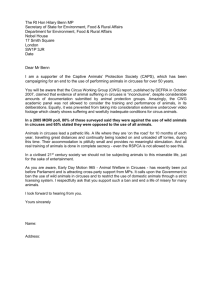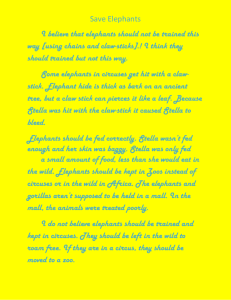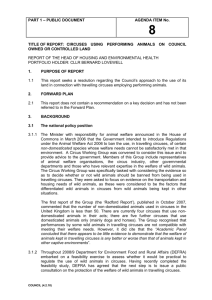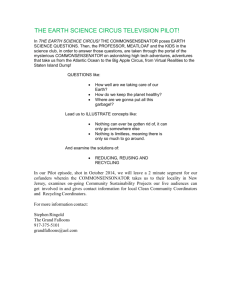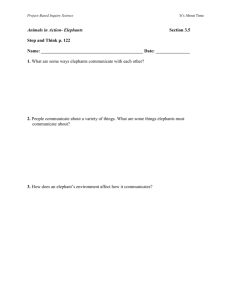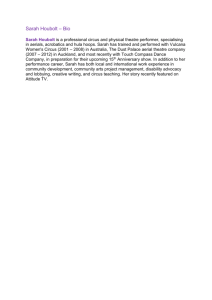Rolang Piocuda unit 3 II
advertisement
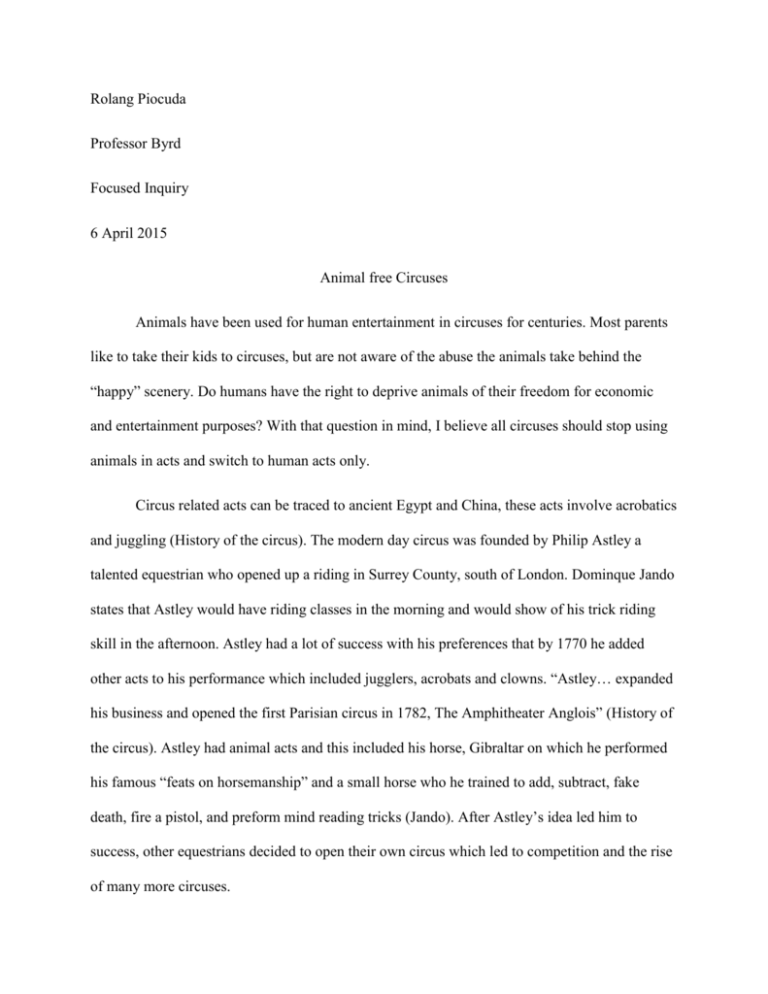
Rolang Piocuda Professor Byrd Focused Inquiry 6 April 2015 Animal free Circuses Animals have been used for human entertainment in circuses for centuries. Most parents like to take their kids to circuses, but are not aware of the abuse the animals take behind the “happy” scenery. Do humans have the right to deprive animals of their freedom for economic and entertainment purposes? With that question in mind, I believe all circuses should stop using animals in acts and switch to human acts only. Circus related acts can be traced to ancient Egypt and China, these acts involve acrobatics and juggling (History of the circus). The modern day circus was founded by Philip Astley a talented equestrian who opened up a riding in Surrey County, south of London. Dominque Jando states that Astley would have riding classes in the morning and would show of his trick riding skill in the afternoon. Astley had a lot of success with his preferences that by 1770 he added other acts to his performance which included jugglers, acrobats and clowns. “Astley… expanded his business and opened the first Parisian circus in 1782, The Amphitheater Anglois” (History of the circus). Astley had animal acts and this included his horse, Gibraltar on which he performed his famous “feats on horsemanship” and a small horse who he trained to add, subtract, fake death, fire a pistol, and preform mind reading tricks (Jando). After Astley’s idea led him to success, other equestrians decided to open their own circus which led to competition and the rise of many more circuses. Modern day circuses have expanded their acts to surpass the performances of rival circuses which have also led to more animals included the acts. Some of the animals that are used for acts include elephants, monkeys, dogs, horses, lions, bear, tigers, lions and seals, these are the animals that are more commonly used, but there could be many other species. The animals are taken out of their natural habitat and forced to do tricks for human entertainment. Some people think this is ok because the acts are funny and amusing to groups of all ages. The people who support this might be using the ethical utilitarian frame work which states a decision should be made in which pleasure overcomes pain. Through that perspective they might be right since the animal acts bring pleasure and laughter to large groups and profit to their owners, but is it worth all the pain the animals have to go through on a daily basis? Animals in the circus acts spend most of their life stuck in a crate since the circuses are usually not stationary and travel to many cities per month. According to People for the Treatment of Animals (PETA), “the animals are confined to boxcars, trailers, or trucks for days at a time in extremely hot and cold weather, often without access to basic necessities such as food, water and veterinary care.” Often animals that are large such as elephants and lions are placed in cages or boxcars that practically only fit their body; the animals have no room to walk and in the same area is where they eat, drink water, sleep and go to the bathroom. Some research done by PETA on the Ringling Bros. and Barnum and Bailey show that these circuses travel for more than 25,000 miles in tours around the country for about 11 months on the year. A single trip can leave the animals locked up for more than a day. Captive Animals’ Protective Society (CAPS) has also done research on circuses and how their extensive travel time has negative effects in the behavior of the captive animals. CAPS has noted strange behavior by the elephants suck as rocking and nodding which is a sign that the elephant is stressed since it is not able roam or socialize like it would normally do in the wild. Not only do the animals suffer due to long distance travel, but they also are mistreated when they are being trained to do the tricks they perform in the shows. Elephants, lions, seals and all the other performance animals are not born with natural abilities to perform as they do in their circus act. These animals must be taught how to do these tricks and most of the time a whip or some sort of agitator. CAPS has gone undercover and seen elephants being beaten by their trainers with sticks that sometimes have screw at the end of them, they are also hit with metal bars. PETA has also gone undercover and seen incidents where blowtorches have been used on elephants. This information has been recovered since these organizations go undercover, but more cruel things could be done to the animals. It is hard to know what else is done to the animals since the government does not monitor how the animals are trained behind the scene (PETA). Getting hit by whips, sticks and metal bars are not the only factors affect the animals physically, animals also have to withstand temperatures that are not suited for them. In European countries animals such as polar bears who need extreme weathers are allowed to be in circuses which are in locations that have hot climates. There have also been cases where the mothers are deprived from their baby to keep them in performances and from getting distracted. The babies are also taught to do tricks when they are young since the audience finds baby animals to be more appealing. The animals of the circuses can sometimes be pushed too far which can lead to fatal accidents. Animals like humans can build up stress due to daily mistreatment. There have been cases where animals such as elephants have suddenly snapped and attacked and even killed their trainers and members of the audience. “In 1994 an elephant named tyke killed her trainer and injured 12 spectators”(Circuses). Tyke was said to be stressed and tired of being beating daily, once the animal began to attack there was no way to tame her so she was eventually gunned down. This is also example of how powerful these animal can be how they can never be fully domesticated. Animal circuses are dangerous for the animal, the trainer and the spectators. Some circuses are already making the switch to only human acts. Due to the persistence of groups such as PETA, CAPS and other anti-animal cruelty associations, some circuses are making changes in their acts and getting ready to become animal free circuses. One of the best known circus, Ringling Bros. have officially declared that they will be retiring their elephants by the year 2018. “After 145 years of featuring elephants in its circus acts, Ringling Bros. will retired its elephant heard”(Bittel). Even though they are not making the change right away, it is a win for animal rights and for the people who have been protesting for the elephants to be freed. Since the name “Ringling Bros.” is so widely known, other circuses may follow its footsteps and also make the switch. Other small circuses cannot afford to lose costumers and will look up the famous circuses as a guide, which means the Ringling Bros. circus could start trend where all other circuses will also retire their elephants. This is only a small test, but it could slowly lead to the retirement of more animals such as tigers and lions and lead towards only human acts in animal circuses. Circuses with entertaining human acts are becoming more popular as they amaze crowds with unbelievable, never before seen acts. “Animal-free circuses have all the thrills, chills, and fun that you expect from the big top-but none of the cruelty to animals”(Animal-free). These circuses use human talent to entertain crowds and performances include human arts such as dancing, magic, street performance and acts one would not think a normal human being could do. These shows are just as entertaining, if not more entertaining than acts in animal circuses where an animal could only be pushed to do so much for the entertainment of others. The best part of animal-free circuses is that the performers are not being forced to perform, but doing it because it is something that they like to do. An animal does not like to perform, especially if it is being punished with a whip or a stick to do the act. The animal free circuses are for audience members of all ages with even showing a whole story through performance dance pieces and light shows. Technology also plays a big role in these animal-free circuses so the show gets better as new technology is incorporated, whereas animal circuses tend to have the same acts year after year. Now there are a lot of groups such as PETA, CAPS, ADI and more who are trying to do all they can to have animal circuses banned all around the world since it is a global problem, but they can’t make this happen without the support of the people. Some people stick to old roots and still enjoy and support circuses with animal acts, but most are not informed of the pain the animals go through every day. If people stop supporting animal circuses, the animal circuses would in the long-run start losing money and eventually die out. People can also inform others of the cruelty and possibly influence others not to support and boycott these circuses. Another way of dealing with this problem is to support circuses that don’t use animals in their acts such as Circus de Soleil, Circus Vargas, Cirque Eloize, Wanderlust Circus, and Cirque Productions who are becoming more recognized for their amazing human performances. By supporting circuses without animal acts, animal circuses will lose money and will either make the switch to only human performances or simply have to close. Works Cited “Animal-Free.” PETA Animal Free Circuses. PETA, 1 Jan. 2011. Web 19 Apr. 2015.<http://ww w.peta.org/living/entertainment/animal-free-circuses/> Bittel, Jason. "Ringling Bros. to Retire Its Circus Elephants." National Geographic. National Ge ographic Society, 5 Mar. 2015. Web. 22 Apr. 2015. <http://news.nationalgeographic.com /news/2015/03/150305-ringling-bros-retires-asian-elephants-barnum-bailey/> CAPS, "Animal Circuses, Animal Suffering." Captive Animals Protection Society. CAPS, 3 June 2010. Web. 6 Apr. 2015. http://www.captiveanimals.org/news/2010/06/animal-circusesanimal-suffering "History of the Circus." PBS. PBS. Web. 7 Apr. 2015. <http://www.pbs.org/opb/circus/in -the-ri ng/history-circus/>. Jando, Dominique. "Philip Astley." - Circopedia. Web. 7 Apr. 2015. http://www.circope dia.org /Philip_Astley#The_Birth_of_the_Circus PETA, "Circuses." PETA. Web. 6 Apr. 2015. <http://www.peta.org/issues/animals-in-ent ertainm ent/circuses/>
